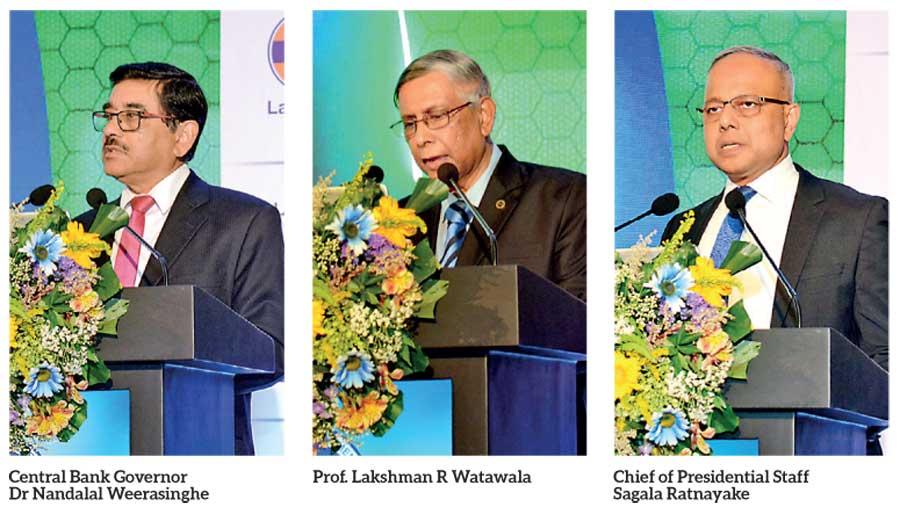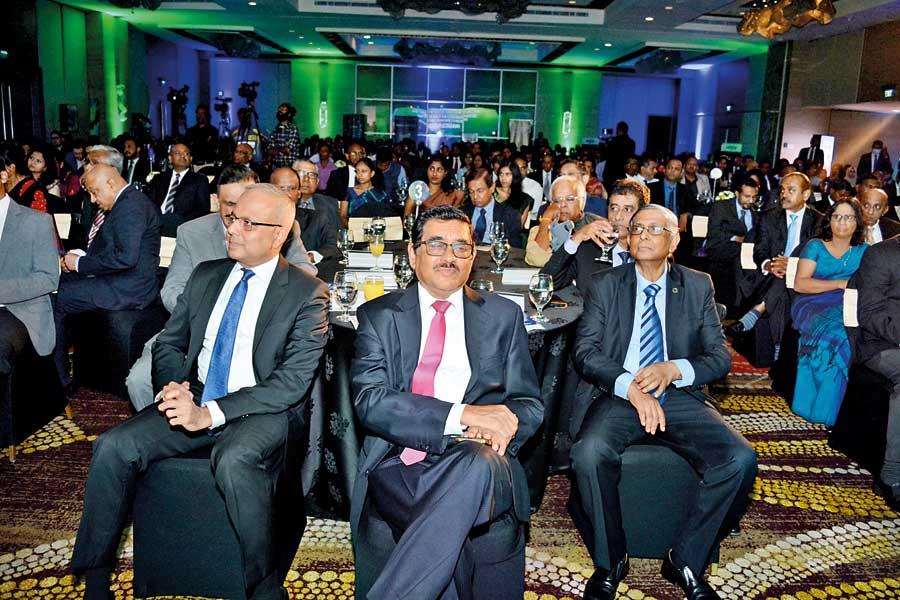22 Sep 2023 - {{hitsCtrl.values.hits}}

The recently concluded 19th Certified Management Accountants National Management Accounting conference shed light on the theme of Sustainability and Value Creation in an economic turmoil. The two-day conference shed light on a range of topics falling under debt restructuring and domestic debt optimization, value creation, accountability and good governance.
Prioritizing industries
“As professional accountants, we need to play a major role in steering the country to achieve stability and advance in the growth path,” said Prof. Lakshman R Watawala, Founder/President of the Institute of Certified Management Accountants, Sri Lanka in his welcome address.
“We have a responsibility to safeguard the assets of the country, we need to bring in efficiency, productivity and cost control with the right strategies in place to overcome the many problems and difficulties that we are faced with,” he said.
“As such, sustainability and value creation are uppermost in our strategic thinking and implementation. In the event that you cannot create value, we don’t think that you can exist for too long. This especially relates to the private sector.
“I had the privilege of serving the state sector as a young chartered accountant for almost 20 years and I have seen that State institutions, if properly managed, if properly run, could be profitable and could also contribute to the economy in employment and skill building.
“Many think that if you import things from abroad, you can enjoy it at a cheaper price. But one should also know that it has great sacrifice. We have seen how many industries have died down and with that, the skills that have been acquired by these people have been lost. Therefore in any country, the industries have to be given priority as they not only provide employment but also bring the skills.”
He further said that domestic debt optimization was a new term but the government has managed to defer these payments with the knowledge and experience of the experts.
“But in the process, we have to do away with waste, and corruption and ensure that society is not burdened with unnecessary costs. Nobody knows what happened to the USD 92 billion that we have as debt. There’s a gap between assets and the money held and there’s a big burden placed on the Governor of the Central Bank on how this gap could be met and how the economy can be turned around.”
Prof Watawala made a special mention of section 55(2) of the constitution which removed the independence of public servants and the subsequent transfer of administrative power to politicians. “Today people are changing constitutions but I don’t know whether they will spot these issues. If you change the constitution we must ensure that there is an independent public service similar to the very high calibre Ceylon civil service we had since independence.”
When they ask a foreign creditor to give us a relief because we have not been able to maintain our fiscal discipline the first question they would ask is what is the assurance that you would come back to maintain fiscal discipline
How the sovereign debt could be made sustainable
Shedding light on debt optimization in his keynote speech, Central Bank Governor Dr Nandalal Weerasinghe said that it was termed that way in order to see the optimum solution considering the impact on all sectors.
“Our sovereign debt became unsustainable and our objective is to make this sovereign debt sustainable. There are certain parameters we agreed with the IMF based on the debt sustainability analysis. Our debt, from 128% of the GDP including sovereign debt and public obligations should be brought down to 95% including external and domestic debt. That is the target.
“Secondly the Gross Financing Needs last year was close to 34% of the GDP and to make it sustainable we have to bring it down to below 13% of the GDP during the period 2027 to 2032. Thirdly on the external debts, 9% of the debt service payments is about USD 6 billion per annum and should be brought down to 4.5% of the GDP. These are the parameters under which we have to design the strategy both with domestic debt optimization and external debt restructuring.”
“If we are to meet these targets we have to make certain contributions from both domestic and external debts. There are several ways in which the domestic sector can make contributions. One is taxation and lowering primary debt and converting to primary surplus. Since that is not enough we need to have some kind of optimization of domestic debt parallel with external debt restructuring. But when we are going to ask external creditors, those who have lent to Sri Lanka, out of their partly official credit is their taxpayers’ money, the commercial credit is pension funds, fund managers and private investors’ money.
“When they ask a foreign creditor to give us a relief because we have not been able to maintain our fiscal discipline the first question they would ask is what is the assurance that you would come back to maintain fiscal discipline.
“We therefore have to prove it. That is where our commitment lies in bringing down the debt targets and we have to show that we are making a serious contribution. This is why we need to convince external creditors that we are genuine in this process. That is why we thought it’s important to show fiscal adjustment instead of moving towards primary surplus through tax policies and other expenditure measures. And in terms of DDO, we are making a genuine effort. When you have a bad track record you have to gain credibility.
He shed light on challenges pending at the Supreme Court.
“But we are now at the final stage of DDO. Still, there’s an ongoing debate but we need to keep this process transparent and engage other stakeholders including the government, banks, trade unions, EPF and some so-called independent research institutions.
“If we deviate from this path we could fall into traps and we need to manage it carefully and strategically. We welcome constructive criticism and we are open to having discussions. If we go in this path we can come out of this crisis and we don’t have to go into the second restructuring.

Structural reforms required for Sri Lanka’s growth
The guest of honour for the event, Chief of Presidential Staff Sagala Ratnayake elaborated on the structural reforms that have been planned by the government. Reflecting on the reforms implemented as part of the IMF programme, Ratnayake said that inflation came down from 69.8% in September 2022 to 4% in August 2023.
“The exchange rate has stabilized and has seen an appreciation over the months and the shortages were eliminated. We are also looking at relaxing the import restrictions and wanted to achieve much of it including the vehicle imports by September but unfortunately, we had to push it back a little because of the debt restructuring and the conversion of the SLDB bonds. The critical thing that the pandemic brought upon Sri Lanka was that it drove up poverty, it was estimated to be at levels of 40%. Ensuring the welfare of this segment was an integral part of our plan. Nutrition was the other problem. Malnutrition started hitting in and we worked with school children, we started the school meal programme and we’re moving into the next stage.
“Along with that, we started other structural reforms required to position Sri Lanka for growth. Some of the structural reforms including the Central Bank Act were critical. Others include the Parliamentary Budget Office and the Data Protection Law.
“The digitization of the economy is another area we are giving a lot of significance where we are pushing all government agencies to accept online payments by March 2024. We have also been pushing hard to diversify state-owned enterprises.
“The education sector is another core area. The President announced that we will have privately owned medical colleges. Optimal utilization of government land, climate change initiatives, modernization of the fisheries sector, and improvements to existing fishery harbours are also in the pipeline. We are also doing our bit in reconciliation.
“The Truth and Reconciliation Commission will be a homegrown establishment. The President also announced the 2030 Defence review which would include the modernizing of the Army and the rightsizing of the military. Climate change too will be a big piece of this puzzle. We have teams working on all of these areas. What is important now is to get through all of these and we need help from the private sector. We need a lot of technical support, various multilateral have agreed to support us and we will reach out to ensure that we are following the right practices. We also will have to start thinking openly and liberally.”
During the inaugural session, Attorney-at-Law and Senior Public Prosecutor Sarath Jayamanne PC spoke on the title fighting national corruption through transparency, accountability and good governance.
Pics by Pradeep Pathirana
09 Jan 2025 25 minute ago
09 Jan 2025 57 minute ago
09 Jan 2025 1 hours ago
09 Jan 2025 1 hours ago
09 Jan 2025 2 hours ago